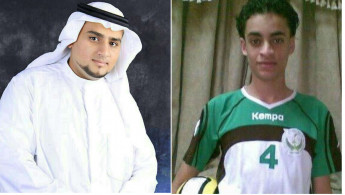Two youths beheaded, tortured by Riyadh were just teenagers
Two out of the 37 Saudi citizens executed by the state on Tuesday were teenagers when they were convicted for their supprot for democratic reforms in the kingdom, it has emerged.
Abdulkareem al-Hawaj was just 16 when he was sentenced to death for his political views in 2012. At the time, he was given no access to a lawyer and was held in solitary confinement for five months.
Activists say he was also beaten and authorities threatened to kill his family during interrogations. He then signed a “confession”, which many believe he did so after torture -- making it the document the only premise for his conviction.
Mutjaba al-Sweikat, also executed on Tuesday, was arrested at around the same time at the age of 17. He was detained at the airport in Dammam on his way to Western Michigan University on the grounds of him allegedly attending a pro-democracy protest in the midst of the the Arab Spring wave of uprisings in 2012.
After his arrest, he was subjected to torture by being beaten all over his body and like al-Hawaj, he was forced into confession through torture.
The Saudi state claims they were killed for inciting “terrorism”. However, they were killed without trial. None of the indictments occurred with thorough judicial oversight.
32 out of the 37 killed followed the Shia branch of Islam, members of which are a minority in the kingdom and subject to constant vilification by the state in Saudi Arabia.
Saudi killing spree
“The Saudi state has a history of killing civilians -- whether through mass executions like we saw yesterday, or consulates or through the killing of mass civilians in Yemen”, Yahya Assiri, exiled human rights activist and founder of watchdog Alqst, told The New Arab.
Saudi Arabia killed prominent journalist Jamal Khashoggi at the Saudi Consulate in Istanbul last year.
Despite all three forms of killings he mentioned happen in different contexts, Assiri urged they are all related because of the extra-judicial nature of them.
“The Saudi state is a state that kills and tortures civilians illegally with no judicial oversight and has no problem in sacrificing its morals in doing so”, he continued.
He added that prior to previous years, Saudi public opinion is drawing away from the killings.
“Previously, when the Saudi state conducted extra-judicial killings, public opinion within the kingdom stayed quiet on the grounds of them being a security threat”, Assiri said.
“With the killings increasing in number and more Saudi civilian activists being detained and tortured, public opinion is beginning to shy away from justifying the barbaric acts”, he added.
At least 100 people have been executed in Saudi Arabia since the beginning of the year, according to a count based on official data released by Saudi Press Agency.
Last year, the oil-rich Gulf state carried out the death sentences of 149 people, according to Amnesty International, which said only Iran was known to have executed more people.
Rights experts have repeatedly raised concerns about the fairness of trials in Saudi Arabia, governed under a strict form of Islamic law.
People convicted of terrorism, homicide, rape, armed robbery, witchcraft and drug trafficking face the death penalty, which the government says is a deterrent for further crime.





 Follow the Middle East's top stories in English at The New Arab on Google News
Follow the Middle East's top stories in English at The New Arab on Google News
![The UAE is widely suspected of arming the RSF militia [Getty]](/sites/default/files/styles/image_330x185/public/2024-11/GettyImages-472529908.jpg?h=69f2b9d0&itok=Yauw3YTG)
![Netanyahu furiously denounced the ICC [Getty]](/sites/default/files/styles/image_330x185/public/2024-11/GettyImages-2169352575.jpg?h=199d8c1f&itok=-vRiruf5)
![Both Hamas and the Palestinian Authority welcomed the ICC arrest warrants [Getty]](/sites/default/files/styles/image_330x185/public/2024-11/GettyImages-2178351173.jpg?h=199d8c1f&itok=TV858iVg)